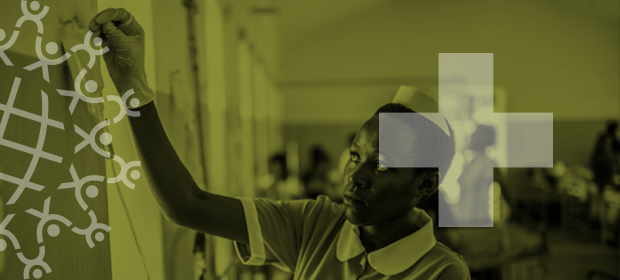Where We Work
See our interactive map



If a new flu pandemic strikes, nurses are likely to be our first—and best—line of defense.
Nurses constitute the largest proportion of the health workforce globally—by a large margin—and in many communities, they are the only health care providers available.
In some places, nurses are also anaesthetists, or perform surgery, or head up entire clinics or hospitals, taking on these advanced roles to fill in the missing pieces of care in their communities. The boundaries of practice get pushed in response to need, often without formal recognition.
And yet there is a global shortage of these and other crucial health workers. The World Health Organization projects a looming shortfall of some 18 million health workers by 2030.
During the Spanish flu pandemic of 1918-1919, good nursing care was the best predictor of a positive outcome.
This is a big problem. Today new challenges face us globally. We all share vulnerability to infectious diseases, and we are all at risk. In 2016, air travel carried some 3.7 billion passengers from place to place around the world. This is how quickly disease can spread among us, from country to country in just a few hours.
And as the cover story in TIME magazine this month points out, the world is not prepared for the next pandemic.
The latest of these significant risks is a pandemic of influenza—specifically a strain called H7N9, a bird flu that has made the leap from poultry to humans in China and has led 88% of humans infected to develop pneumonia, and killed 41%. Fortunately for us, H7N9 has not yet begun to spread easily from human to human.
Nurses are on the front line of this changing world, as they have always been. During the Spanish influenza pandemic of 1918-1919, which infected about a fifth of the world’s population at the time and killed an estimated 50 million people, good nursing care was the best predictor of a positive outcome for a sick person.
But even then, there were not enough nurses to care all those who desperately needed them. Flu-stricken communities that called on neighbouring hospitals for help were often told the hospitals could send doctors aplenty, but not a single nurse could be spared.
And today, with our expanded population and nonstop air travel, the world is far more vulnerable than we were in 1918.
All countries are grappling to respond to the changing world of health care—ever more sophisticated technologies, shifting epidemiology and demography, more people with more information and questions. And the ever-present need for more health workers, with more training, stationed where they are needed most.
In many countries, nurses form the bedrock of the primary care system, and may be the only health care provider that people see. Should a new flu pandemic strike, most first responders are likely to be nurses. And for many reasons, they are likely to be the best responders, too.
In rural areas and industrial and low-income settings, nurses know their communities. They build relationships with their clients, and are well placed to spot the unexpected. It will be the community nurse who notes how many people are asking for help with fevers and sore throats, and that some of those people are not getting better.
Nurses are often invisible until they are needed.
This is a critical position; these nurses are a force for public health.
And yet the value of nurses to society and to public health has seldom been explored or acknowledged outside the nursing profession. The 2016 report Triple Impact from the All-Party Parliamentary Group on Global Health urgently recommends raising the profile of nursing globally and enabling nurses to work to their full potential. For this to happen, nurses need the support of policy makers and politicians.
Nurses are often invisible until they are needed. They tend to be women, to have less pay than physicians (or even male nurses), and to be absent or underrepresented in key decision-making roles, especially in countries where most physicians are men. And offering compassionate care—which is at the heart of nursing—is sometimes mistaken for a kind of weakness.
But it isn’t.
Nurses offer a wealth of clinical skills that can be harnessed to make the health system stronger, more responsive and able to cope with changing demands. The Triple Impact report says that nurses have an enormous part to play in achieving universal health coverage and should be central to policies and plans. They have the same huge role in protecting us all through early detection and treatment of possible pandemics.
If there is to be an effective response to global disease threats—pandemics as well as the incoming tide of noncommunicable diseases—nurses will be essential. They will—literally for some people—make the difference between life and death.
Today it is time to get tough. Nurses are—and always have been—on the front lines of care, not because they are angels, but because they are knowledgeable, skilled, and present in their communities. We should honor nurses, and we should support them. They are the sleeping giants of health care—let’s help them rise.
Get the latest updates from the blog and eNews




